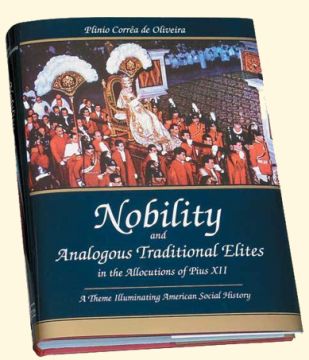|
Plinio Corrêa de Oliveira
Chapter VII
Its Past and
Present Mission
|
|
|
Henri du Vergier de La Rochejaquelein (1772-1794), the youngest general of the Royalist Vendéan insurrection during the French Revolution The study of the allocutions of Pius XII to the Roman Patriciate and Nobility arouses the curiosity of the average person, especially because the public is often surprisingly uninformed about the nobility, its origins, its role, and the various traits it has assumed throughout the ages. His curiosity, however, may not be wholly satisfied by reading these allocutions. In them, the Pontiff did not comment on the nobility in all its aspects. This is not surprising, since he was addressing nobles, naturally acquainted with many doctrinal and historical facts concerning the nobility. This may not be the case with readers of this work. To satisfy the curiosity of many intelligent but incompletely informed readers, this chapter presents a compilation of facts about the nobility that may be difficult to find readily available in a single work. Containing multiple considerations on diverse themes, this chapter is naturally one of the book’s longest. In order not to extend it, the number of citations has been limited to an indispensable minimum. 1. The Private Sphere and the Common Good a. Human groups—leaders In any human group existing in the private sphere, the exercise of authority confers a certain prominence. This is the case of a father,—and, in participation with him, his wife—the president of an association, a professor, the coach of an athletic team, and so on. 1) Intellectual Requisites of a Leader The exercise of authority requires certain qualities. In the first place, the leader must have a clear and firm notion of the objective and the common good of the group he directs. Then he needs a lucid knowledge of the means and procedures to attain this good. These intellectual qualities, however, do not suffice. The leader must also be able to communicate his knowledge and, as much as possible, persuade those who differ. However broad his powers, however drastic the penalties imposed on those who disobey, however honorable and generous the rewards conferred on those who do obey, these factors are not enough for the leader to make himself obeyed. A profound and stable consensus must exist between his subordinates and him regarding his objectives and methods. His subordinates must also have earnest confidence in his capacity to employ these methods correctly and achieve these goals, all in view of attaining the common good. 2) Requisites of the Will and the Sensibility Moreover, it is insufficient for the leader merely to persuade through flawless logical argumentation. Other attributes are also necessary. These lie in the realm of the will and the sensibility. Above all, the leader must be gifted with a penetrating psychological sense. This quality requires the simultaneous exercise of the intelligence, will, and sensibility. A very intelligent but weak-willed and unperceptive person ordinarily lacks the psychological sense needed to fathom even elementary aspects of his own mentality. How much less can he fathom that of others, such as his spouse, children, students, and employees. For a leader lacking psychological sense it is difficult not only to persuade the minds of subordinates but also to unite their wills for a common action. Not even this psychological sense, however, suffices. The leader must also be endowed with a sensibility rich enough to suffuse whatever he says with the flavor of reality, honesty, authenticity, and a touch of interest and inspiration that prompts those who should obey him to follow joyfully. In brief, these are the qualities without which someone who presides over a private social group will lack the conditions to fulfill his mission in ordinary circumstances. 3) The Leader in Exceptional Circumstances, Whether Favorable or Adverse However, exceptional circumstances, whether favorable or adverse, occasionally alter the normal order in any private group. Unable to rise to the occasion, the average leader risks losing the excellent opportunities that he either fathoms incompletely or misses altogether. In this way, he lets them slip by, taking either partial advantage of them or no advantage at all. Should he prove incapable of discerning danger when it appears on the horizon, evaluating the threat it poses, and devising means to eliminate it as quickly as possible, he risks seriously harming the group under his direction and even causing its ruin. When confronted with exceptional occasions, whether favorable or unfavorable, a good leader is stimulated by them and grows in his qualities in proportion to the exceptional nature of the circumstances, thereby proving himself superior to them. 4) The Usefulness and Timeliness of Systematizing These Concepts None of this is new. However, since these commonsense ideas have become blurred in many minds in our confused times, a succinct systematization has become necessary for easily understanding what follows. b. The superiority and nobility of the common good—its distinction from the individual good— private organizations whose common good has a transcendent character, whether regional or national Regarding groups of any kind in the private sector, we can say that since the common good of the group—in other words, its general good—is higher than the individual good of its members, it is ipso facto nobler. 1) The Importance of Private-sector Organizations for the Common Good of the Region, the Nation, and the State At times the common good of a private organization transcends itself, rising to another level. We will illustrate this point with the following example: A private university—of which there are so many in America and Europe—frequently develops its own style of researching, thinking, and teaching. Its intellectual achievements are molded by this style and corresponding religious, patriotic, artistic, and cultural impulses. Having distilled an enduring set of values, the university perfects and transmits it from one generation of teachers and students to the next. This tradition constitutes a precious boon for the successive generations of academics. It deeply marks the lives of the graduates and creates a human type that can influence the character of the city around or near the university. It is obvious that this institution, although private, constitutes a common good for the region and, depending on the case, the whole country. Private institutions like this university enable us to understand better the regional or national common good. Their excellence brings them closer to this common good, and thus they acquire a certain nobility that is not to be confused with the dignity, indeed authentic, of institutions limited to the private sector. 2) The Family: a Special Private Society Of all these private institutions, none is as fundamental as the family: the greatest source of authentic and dynamic life for the nation and the State. It will be discussed in section two of this chapter. * * * Thus, we see how the impact and influence of private institutions can deeply mark the political life of a nation, and even the international order, and thus safeguard the country from cliques of adventurers. This impact and influence result largely from the intensity, vitality, and cohesion of these institutions, and from the continuous striving for improvement that animates them. c. The nation and the State are born from the private sphere—the plenitude of the common good 1) The Formation of Nations and Regions A nation is born when an ensemble of people, social groups, and associations dedicated to the private good—or cumulatively to the private and the common good—coalesce into a whole that is clearly distinct from everything outside it. It becomes a closed circuit of an ethnic, cultural, social, economic, and political character, and does not allow itself to be included or federated into any larger whole. The common good of this nation, which constitutes a state when politically organized, hovers above the good of each of the constituent groups. The latter, in turn, hovers over the good of each individual.121 An analogous affirmation could be made with regard to a region. A region is a territorial reality with an ensemble of constituent elements similar to those of a nation. It differs from the nation in that it does not embrace all the constituent elements of a nation, but only a significant part of them. The difference between the various regions of a nation results from the fact that the constituent elements usually vary from one region to another. A comparison may clarify this point. Regions differ from each other and from the nation as a whole like different carvings in the same stone. Nations differ from one another like one statue from another. Sovereignty is proper to nations; autonomy is proper to regions. An example of this is found in federal states, which are sovereign and composed of autonomous federated units. 2) The State as a Perfect Society—Its Sovereignty and Majesty—Its Supreme Nobility The common good in this sense encompasses all subordinate goods without absorbing or repressing them. This encompassing gives the State a supremacy of mission, power, and, therefore, intrinsic dignity, which is adequately expressed by the word majesty.122 A nation normally constitutes a complete and perfect123 society. Regardless of its form of government, this society is sovereign and majestic. Its majestic power is supremely noble. By virtue of being sovereign, that is, supreme, it has an intrinsic natural nobility superior to that of the intermediate bodies between the individual and the State. Everything said before corroborates this. Footnotes: (122) The Latin majestas derives from major, the comparative form of magnus, which means great, both in the physical and moral senses. It often includes the accessory meaning of force, power, and nobility. This makes magnus an honorific or laudatory epithet in elevated language. The same meaning extends to its derivatives and composites. (Cf. A. Ernout and A. Meillet, Dictionnaire etymologique de la langue latine—Histoire des mots, 4th ed., [Paris: Editions Klincksieck, 1979], p. 377.) (123) From the Latin perfecta, which means completed, finished, terminated. |
|


